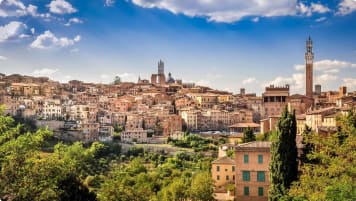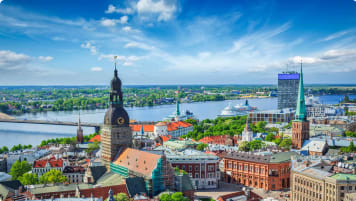Castellammare di Stabia, Italy
Article about Castellammare di Stabia in Southern Italy for senior couples and mature solo travellers joining a small group tour of Italy.
31 Oct 21 · 6 mins read
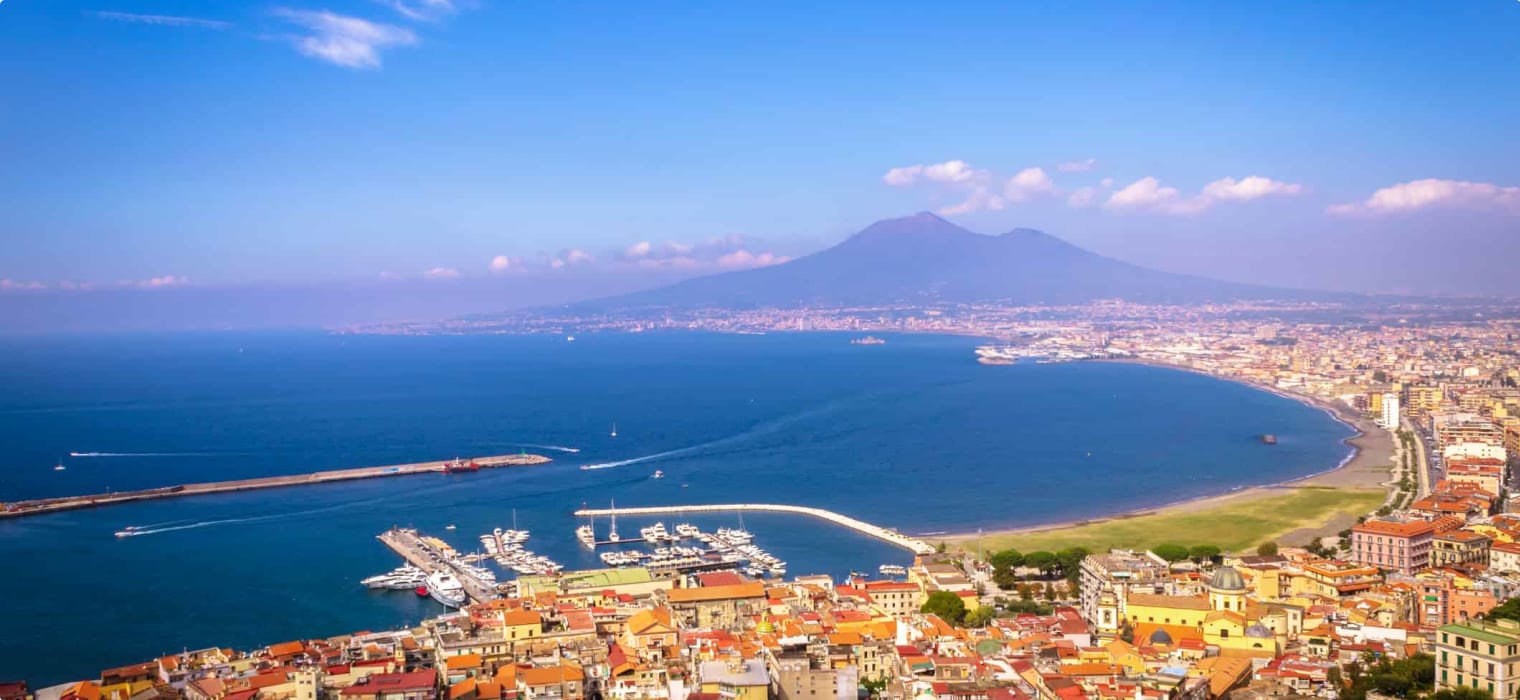
Castellammare di Stabia
Situated on the pristine Sorrento Coast in the Bay of Naples, Southern Italy, the small town of Castellammare di Stabia has been attracting high profile visitors for centuries. Famous for the healing properties of its thermal mineral waters, many a fine beach and beautiful scenery, it has long been a popular summer resort location. Today midway between the tourist hotspots of Pompeii and Sorrento, the archaeological finds of the Roman resort of Stabia, charming architecture, numerous churches and wonderful works of art all make Castellammare di Stabia a perfect holiday spot for those who revel in cultural and historic excursions beside amazing beaches.
Odyssey Traveller conducts a tour of Castellammare di Stabia as part of our Heritage Italy tours with the option for a full 22-day long tour or shorter 11-day trip. We stay five nights at a hotel accommodation in the town to enjoy the local attractions and visit nearby locations including the preserved Roman city of Herculaneum, Italy’s earliest Greek settlement of Cuma, the archaeological sites of Pompeii and Paestrum, as well as numerous sea side spots along the stunning coastal scenery of the Amalfi Riviera. This article explores the history and attractions of Castellammare di Stabia to assist your guided tour.

The History of Castellammare di Stabia
The ancient town of Stabiae was occupied successively by the Oscans, Etruscans, Samnites and finally the Romans from the 4th century BCE. Dotted with holiday home luxurious villas and famous for its mineral water, it was a popular holiday resort among the Roman elite. Perhaps most notably, the Roman scholar and statesmen Cicero used to spend his vacations here.
However, when the nearby Mount Vesuvius erupted in 79 CE the entire town, along with nearby Herculaneum and Pompei, was destroyed and covered with volcanic ash. Although the settlement was eventually rebuilt, its inhabitants were subsequently forced to flee to the mountains to escape the invasions of the Goths and Lombards.

The medieval castle, from which the city takes its name, was erected in the 9th century on a hill overlooking the Gulf of Naples by the Sorrentines in order to protect their duchy. It was restored during the reign of the Holy Roman emperor Frederick II and subsequently enlarged by King Charles I of Anjou. The ruins of the castle remain today on private property and can be admired from outside. The Angevin dynasty later built walls around the town, enlarged its harbour, and built the Royal Palace for the king’s vacations.
In 1783 the Bourbons created a prosperous shipyard which fuelled the development of the town. Today it remains an important shipyard with Castellammare di Stabia being a commercial and industrial port centre focused on food products, paper, and cement manufacturers.
Ancient Ruins
The ruins of the ancient Roman city of Stabiae are a must see. First discovered in 1749 during the reign of Charles of Bourbon, it was not until 1950 that several archaeological sites were systematically excavated. While nearby Pompei and Herculaneum were residential cities, Stabiae was primarily devoted to the resort, so much so that luxurious residential villas were the norm. Today three well-preserved villas with lavish mosaics and frescoes are open to the public.
Villa Adriana consists of four main areas: service areas and thermal environments on either side of the summer triclinium, dating back to the reign of Nero; the large gymnasium attached to the villa in the Flavian. Its frescoed walls show almost life-size scenes related to mythology inspired by Dionysus, while its floors are mosaic motifs in black and white.
The Second Complex is a building connected to villa Adrianna. The peristyle opens onto a porch introducing a different environment with panoramic sea views. The north area of the house consists of the dining room and bedroom, while the south side (closed to the public) has a portico with columns and a spa district.
Villa San Marco meanwhile is a typical residential villa with swimming pool and garden offering a glimpse into the extent of the luxuries that the wealthy citizens of Castellammare di Stabia indulged in. The entry led to a spa district consisting of a hot room, cold room and tepidarium. Marbled walls painted at the bottom and top fill the environment.
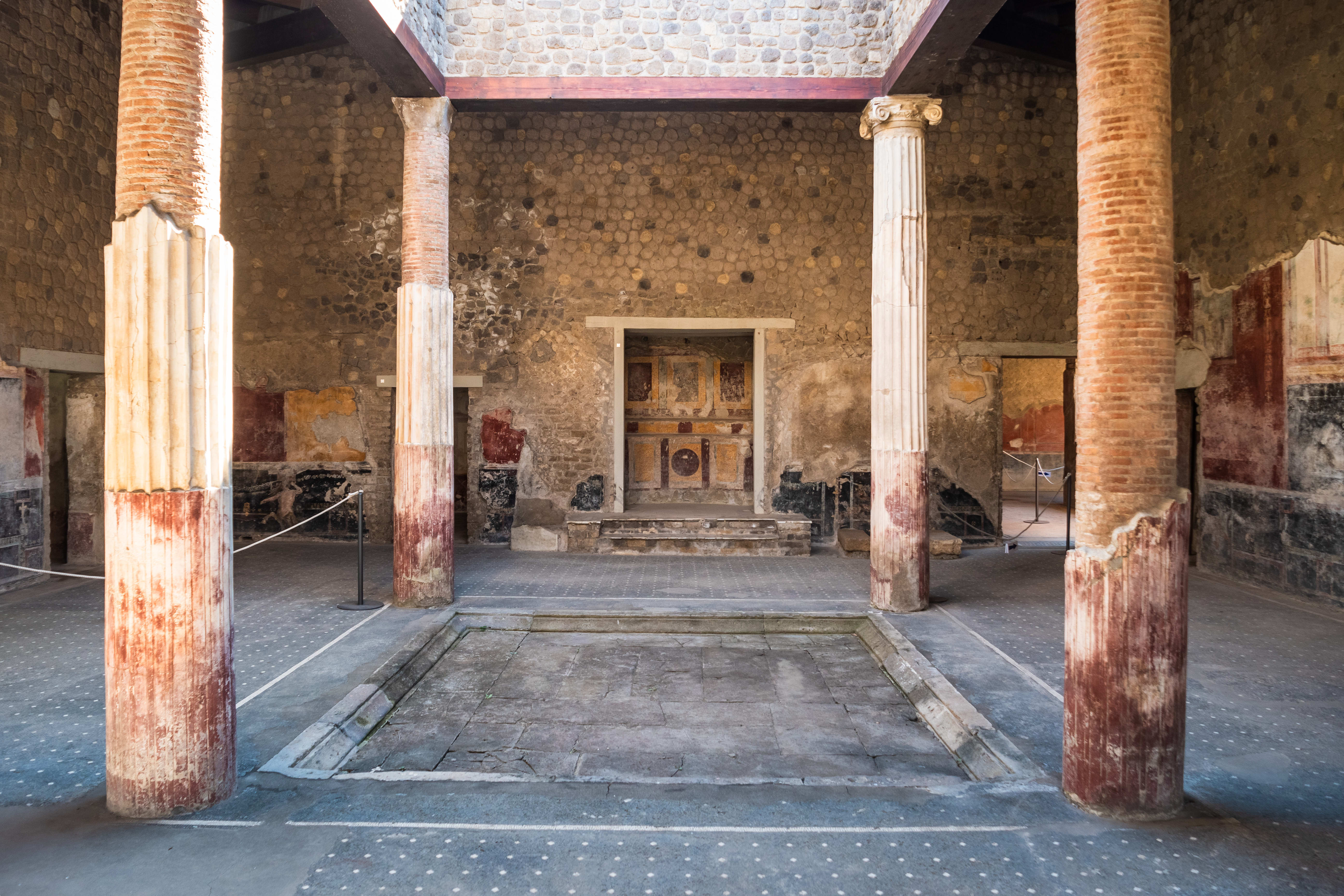
The Stabian Antiquariam also has objects on show from the excavations of ancient Stabiae. Its eleven halls show the preserves of numerous frescoes, including the “Mito di Edipo”, “Dionisio”, “Ercole bambino”, “Fanciulla che dorme” and various other Hellenic style paintings.
Thermal Bath Location
Since the 1800s, Castellammare di Stabia has been well renowned as a thermal baths centre. The thermal water of the baths flows from 28 different springs along the slopes of Mount Faito consisting of chemical compositions of sulphurous, calcic bicarbonate and mineral water. The different compositions allow for a wide range of therapeutic treatments.
There are two different thermal baths, one in the historical centre of the town and the other on the hill. The Ancient Thermal Baths, built in 1836, are open for a few hours each day for bathing and hosts cultural events in the summer. The New Thermal Baths, inaugurated in 1964, has two buildings dedicated to thermal cure and hydroponic cure. It also has a park which hosts concerns, open cinema, exhibitions, and conventions in the summer.
Historic Churches at Castellammare di Stabia
Castellammare di Stabiae hosts a number of impressive historic buildings including Castellammare Cathedral, San Bortolomeo, Santa Caterina, Chiesa del Gesù, and Chiesa del Purgatorio. The most historically and culturally significant is arguably the Castellammare Cathedral dedicated to the St. Mary of the Assumption and St. Catellus. Located in Piazza Quartuccio, its current formation was built in 1587 after being damaged in the earthquake of 1436. Inside you can admire notable paintings by Giuseppe Bonito, Jose de Ribera, Nunzio Rossi, sculptures by Jerace and a highly important, nineteenth-century crib with life-size shepherds.

Tour of Castellammare di Stabia
Odyssey Traveller visits Padua as part of our Heritage Italy tours, both 22-days and 11-days. Examining the heritage, history, and culture of Italy, our full private tour takes you on a journey from the eternal city of Rome into the rolling terracotta countryside of Tuscany with its hilltop towns and on to the olive-clad slopes of the Paduan Hills. We stay in the green and craggy landscape of Umbria and spend 5 days at Castelammare di Stabbio on the Bay of Naples where we have the chance to view the breath-taking scenery of the UNESCO World Heritage Site, Amalfi Coast, with its whitewashed villages tumble into azure blue seas.
Our fully escorted small group tour of Italy features guided walks through the best of the Italian countryside. We also take in many of Italy’s major cities. These include viewing the Renaissance cities of Florence, Pisa, and Lucca. We also visit the Umbrian medieval cities of Perugia, Gubbio, and St Francis’ Assisi. In the north of Italy, we visit the ancient university seats of Verona and Padua. We take in the stunningly beautiful Venice. Meanwhile, in the south, we visit the spectacularly cosmopolitan city of Naples, the Roman remains of Pompeii and the island retreat of Capri.
Odyssey Traveller has been serving global travellers since 1983 with educational tours of the history, culture, and architecture of our destinations designed for mature and senior travellers. We specialise in offering small group tours partnering with a local tour guide at each destination to provide a relaxed and comfortable pace and atmosphere that sets us apart from larger tour groups. Tours consist of small groups of between 6 and 12 people and are cost inclusive of all entrances, tipping and majority of meals. For more information, click here, and head to this page to make a booking.
Articles about Italy published by Odyssey Traveller
- The Roman Empire
- Who were the Roman Emperors
- Questions About Italy
- Trip Advice for Travellers going to Italy
- 10 Great Books to Read Before You Visit Italy
- as well as more articles on Italy here
External articles to assist you on your visit to Italy
Related Tours
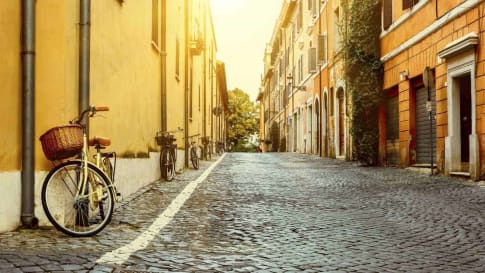
22 days
Sep, Apr, MarHeritage, Culture and History of Italy | Small Group Tours for Seniors
Visiting Italy
Rome, the world’s first superpower, lasted for almost a thousand years. In this small group tour for senior couples and solo travellers we thread our way through the Rome of the Emperors, then through the Italy of the Renaissance, Michelangelo, the Medici, and the Borgia. In the south, we visit the cosmopolitan city of Naples as well as Pompeii and the island retreat of Capri.
From A$13,695 AUD
View Tour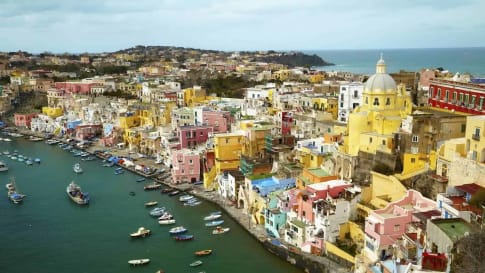
22 days
Jan, Apr, SepAncient History of Southern Italy & Sicily group tours
Visiting Italy
Our program for senior travellers, as well as featuring the rugged countryside of Southern Italy, also encompasses learning about the many civilisations that have shaped this land. We learn about the influence of the early Phoenicians, Greeks, Romans, Byzantines, Saracens, and Aragonese.
From A$16,995 AUD
View Tour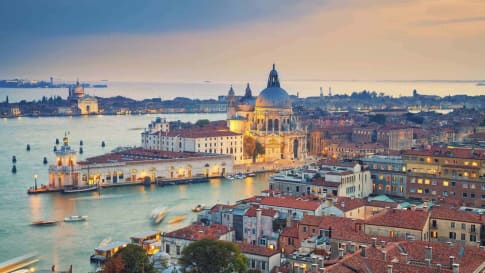
18 days
Aug, SepArt and History of Italy | Small Group Tour for seniors
Visiting Italy
Taken as a whole, Italian Civilization (which includes, of course, the splendid inheritance of Ancient Rome) is absolutely foundational to Western culture. Music, Painting, Sculpture, Architecture, Literature, Philosophy, Law and Politics all derive from Italy or were adapted and transformed through the medium of Italy.
From A$16,695 AUD
View Tour
20 days
May, OctCaravaggio’s Journey | Small Group Tour in Italy
Visiting Italy, Malta
On this small group tour of Italy and Malta for mature and senior couples and solo travellers we trace the life of Caravaggio, exploring the artistic works he left behind and the tumultuous life he led. We follow him from his birthplace in Milan to Rome, Malta, Sicily and Naples. In each place he lived Caravaggio left behind a rich legacy of art for us to admire.
From A$15,125 AUD
View TourRelated Articles

10+1 Great Books About Italy Before You Visit
Italy, a favourite destination for travellers of all ages. Consider a small group package tour for mature and senior travelers for couples and singles to Italy. Offer history, walking and general discovery tours and long stay programs in Florence.
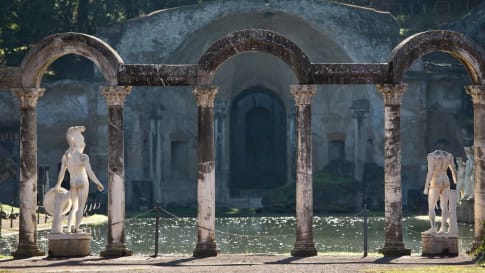
Ancient Roman Luxury Villas, Italy
Roman houses for wealthy people built in the times of the Republic and the Empire. Popular locations included on the lakes of Northern Italy, in the hills to the East of Rome, on the bay of Naples, and outside of Pompeii.

Around the World in Six Coffees: Italy, France, Japan, China, Morocco & Argentina
Around the World in Six Coffees: Italy, France, Japan, China, Morocco & Argentina Order a cappuccino in Italy after 11am and expect to receive strange looks. In Argentina, don’t be surprised when your coffee order…
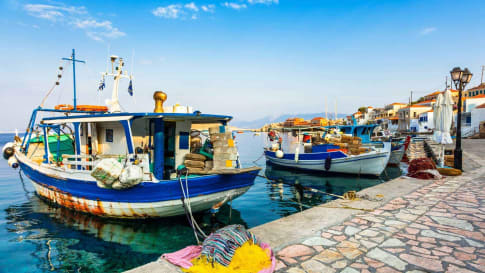
Empires Crossing the Mediterranean: 1130-1300
As a sea connecting continents and stretching from the Atlantic Ocean in the west to Asia in the east, the Mediterranean has for centuries been a centre of trade and exploration.

Mediterranean Islands: Malta, Sicily, Sardinia and Corsica
Malta, Sicily, Sardinia and Corsica: An Educational Journey through Western Mediterranean This article takes you on a journey through the beautiful islands of the western Mediterranean – Malta, Sicily, Sardinia and Corsica – by tracing…
